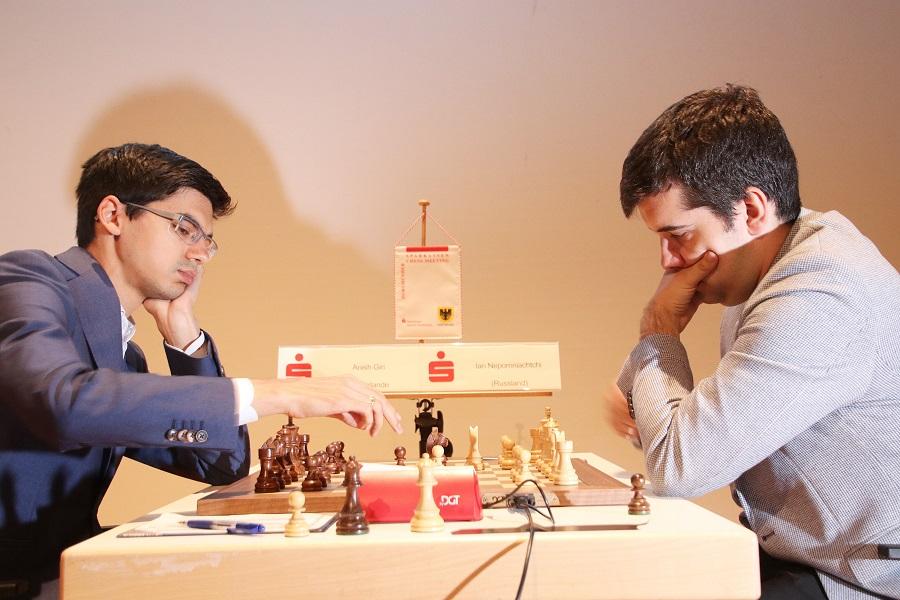
Dortmund R1: Nepomniachtchi Declines Giri's Birthday Gift
On his 28th birthday Ian Nepomniachtchi reached a winning position in a queen endgame vs Anish Giri but failed to convert. The other three games of the 46th Sparkassen Chess Meeting's first round also ended in draws.
This year's Dortmund tournament took off on Saturday afternoon in the Orchestra Center NRW, and more than six and a half hours all games had ended peacefully. There was definitely some fighting chess though. Especially our Game of the Day saw lots of nice, hidden resources.
Schach ist Kunst/Chess is art: Exhibition by Christiane Köhne at @Orchesterzentrm in @stadtdortmund where SCM 18 started today. #dochess pic.twitter.com/vb3C9U79wC
— Sparkassen CM (@SparkassenChess) July 14, 2018
Examples from an art exhibition in the playing hall.
Ian Nepomniachtchi, who played this first round on his birthday, had only faced Anish Giri three times before in classical chess. There was one draw, and both had won one game.
If you included rapid and blitz games, the story was quite different. The speed chess specialist that he is, Nepomniachtchi was leading 7.5-2.5.
In Saturday's game, a Petroff, the Russian grandmaster managed to create threats against the opponent's king. Giri initially played accurately. He reached a queen endgame a pawn down, but it was most likely a draw.
On move 46, Nepomniachtchi's maneuvering and patience could have been rewarded. While the Dutch GM had given some good intermediate checks with his queen earlier on, this time he skipped those and took a pawn. Two moves later Nepo chose the wrong square for his king, "declining" the birthday gift.

Nepomniachtchi had his birthday dinner with his second GM Vladimir Potkin.
Vladimir Kramnik was held to a draw by Liviu-Dieter Nisipeanu, who used the 6...Bf5 line of the Queen's Gambit Declined, Exchange Variation. It leads to a slightly worse endgame, but the Romanian-born grandmaster apparently didn't mind suffering a bit.
In the main line, the c8-bishop is often Black's problem piece and he would love to trade it for White's light-squared bishop. There's a known, intricate plan with the moves Nb8-d7-f8-e6, g7-g6, Ne6-g6 and Bc8-f5 to do so, but with 6...Bf5 Black is saying: why no the easy way?

Dortmund's mayor Birgit Jörder making the opening move. | Photo: Georgios Souleidis.
7.Qf3 is the positional refutation, as it forces a doubled pawn on f6. But players such as Anatoly Karpov and Boris Spassky were among the early adopters, later it was tried several times by e.g. Nigel Short and these days it's a well respected line, also played by, among others, Kramnik.
The 14th world champion got crushed, however, when Magnus Carlsen, helped by his second Jon Ludvig Hammer, unleashed the novelty 12.Ne2 at the 2016 Norway Chess tournament. White immediately goes for control of the f5-square.
I have played Kramnik's line several times, with reasonable results but this has gone completely wrong #NorwayChess @MagnusCarlsen
— Nigel Short (@nigelshortchess) April 27, 2016
Kramnik decided to copy that method but Nisipeanu obviously knew it, and deviated with 12...f5. That move had already been played successfully three weeks after Carlsen-Kramnik, by Igor Kovalenko, at the 2016 European Championship.
That, combined with Nisipeanu's pawn sac 18...f4! led to a position where Black could hold by doing absolutely nothing. Black had played 20(!) insignificent rook moves on the first rank when Kramnik gave up his attempts.
"Chess ugly and a draw," Kramnik said afterward.
All together. Give a smile, you are in sunny @stadtdortmund 👍🏼😎😀🌞 #dochess pic.twitter.com/sP47MImDLa
— Sparkassen CM (@SparkassenChess) July 13, 2018
Radek Wojtaszek, last year's winner, played the quickest draw. Georg Meier successfully defended against the English Opening (1.c4) with the English Defense (1...b6). This turned into a great surprise weapon against the wonderful theoretician from Poland when Meier played the obscure move 6...e5!, which perhaps wasn't met with the most critical reply.

A good start for Georg Meier. | Photo: Georgios Souleidis.
Jan Krzysztof Duda and Vladislav Kovalev played the longest game and it was slightly similar to the Kramnik-Nisipeanu endgame. White had a pleasant positional advantage, but failed to get anything tangible.

Polish number one Duda vs Aeroflot qualifier Kovalev. | Photo: Georgios Souleidis.
Round two pairings, Sunday 3 p.m. (6 a.m. Pacific, 9 a.m. Eastern): Meier-Giri, Kovalev-Nepomniachtchi, Nisipeanu-Duda, Wojtaszek-Kramnik. You can follow the games in Live Chess.
Games via TWIC.
Earlier post:


